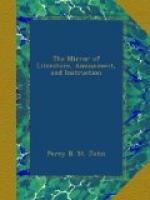For wheresoe’er they turn their
ravish’d eyes,
Gay gilded scenes and shining prospects
rise,
Poetic fields encompass them around,
And still they seem to tread on classic
ground;
For there the muse so oft her harp has
strung,
That not a mountain rears its head unsung:
Renown’d inverse each shady thicket
grows,
And ev’ry stream in heav’nly
numbers flows.
Notwithstanding this beautiful description, my scepticism will not allow me to believe in these miraculous genii.
Lord Byron mentions these improvisatri, in his “Beppo,” but not in a way that leads me to suppose, he considered them capable of original poetry. Mr. Addison, in his account of Italy, says, “I cannot forbear mentioning a custom at Venice, which they tell me is peculiar to the common people of this country, of singing stanzas out of Tasso. They are set to a pretty solemn tune, and when one begins in any part of the poet, it is odds, but he will be answered by somebody else that overhears him; so that sometimes you have ten or a dozen in the neighbourhood of one another, taking verse after verse, and running on with the poem as far as their memories will carry them.”
I am, therefore, inclined to think these “improvisatri” are mere reciters of the great Italian poets. It is probable that the persons who give us these extraordinary accounts of Italian genius, are unacquainted with the literature of that country, and of course cannot detect the imposition.
* * * * *
In Goldsmith’s poem, entitled “Retaliation,” a line occurs, which is to me unintelligible, at least a part of it. That poet concludes his ironical eulogium on Edmund Burke, thus:—
“In short ’twas his fate,
unemployed, or in place, sir,
To eat mutton cold, and cut blocks
with a razor.”
The cutting blocks with a razor, I think is obvious enough, but, what is meant by eating mutton cold? I should be obliged by a solution. Hen. B.
* * * * *
I’ll come to your ball.
(For the Mirror.)
I’ll come to your Ball—dearest
Emma,
(I had nearly forgotten to
say)
Provided no awkward dilemma
Should happen to keep me away:
For I burn with impatience to see you,
All our hopes, all our joys
to recall,
And you’ll find I’ve no wishes
to flee you,
When next I shall come to
your Ball.
Strange men, stranger things, and strange
cities
I have seen since I parted
from you,
But your beauty, your love, and your wit
is
A charm that has still held
me true,
And tho’ mighty has been the temptation,
Your image prevail’d
over all,
And I still held the fond adoration
For one I must meet at the
Ball.




